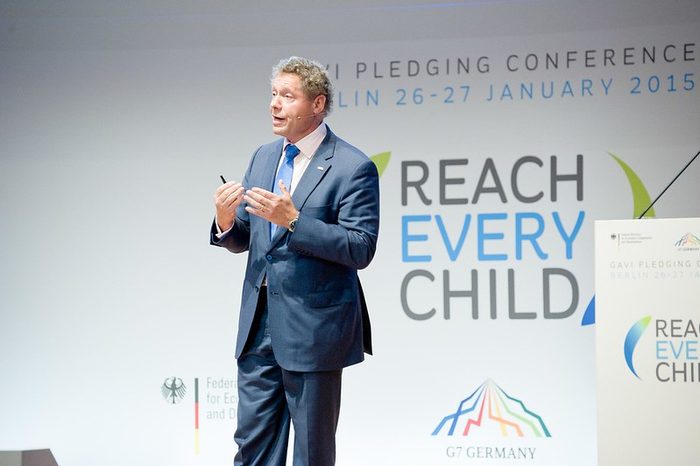Good morning, this is Kasmira. It’s the last day of a UN session dedicated to the rights of Indigenous Peoples, which spilled over into the streets of Geneva with a march on Tuesday in recognition of their rights - see our story below.
And as Gavi's chief executive Seth Berkeley prepares to step down at the beginning of August, he looks back on his career - would he have done anything differently at the global vaccine organisation that sought to bring vaccines to developing countries through its COVAX programme? |

Seth Berkeley, Gavi's outgoing chief executive (Credit: Gavi/Flickr)
|
|

Delegates gather outside the Palais des Nations for the start of the march, 18 July 2023. (Credit: Geneva Environment Network/Harvey Parafina)
|
|
A march for indigenous rights that started 100 years ago.
As a UN session on the rights of Indigenous Peoples took place in Geneva this week, delegates left the usual rooms of the Palais des Nations for a march commemorating 100 years since Haudenosaunee leader, Deskaheh, came to Geneva to address the League of Nations and defend the rights of Indigenous Peoples.
A photo exhibition along the quai Wilson, where the march ended, traces Deskaheh’s journey. Composed of Swiss and North American photographs and archival documents, it also tells the history and culture of the Haudenosaunee, a confederacy of six Native American nations.
Deskaheh is considered the first Indigenous person to have raised at the international level the issue of the loss of autonomy and the dispossession of First Nations by colonising states. However, his appeal to the League of Nations to recognise his peoples’ sovereignty fell on deaf ears and they refused to allow him to address the assembly, arguing that Canada had jurisdiction over the Six Nations.
Speaking at the march and the official opening of the exhibition, Pierrette Bierraux, director of the Peoples' Center for Documentation, Research and information (Docip) in Geneva, one of the exhibition partners, also stressed the critical role Indigenous Peoples play in protecting the environment through their knowledge, customs and traditions.
“Our western societies invented the concept of sustainable development. Indigenous peoples on the other hand have been practising sustainable development since the beginning of time. It could well be that their knowledge will be very useful to us in the years, decades, and centuries to come but only if they can live fully as peoples.”
|
|
|
GS news is a new media project covering the world of international cooperation and development. Don’t hesitate to forward our newsletter!
Have a good day!
|

|
|
Avenue du Bouchet 2
1209 Genève
Suisse
|
|
|
|









